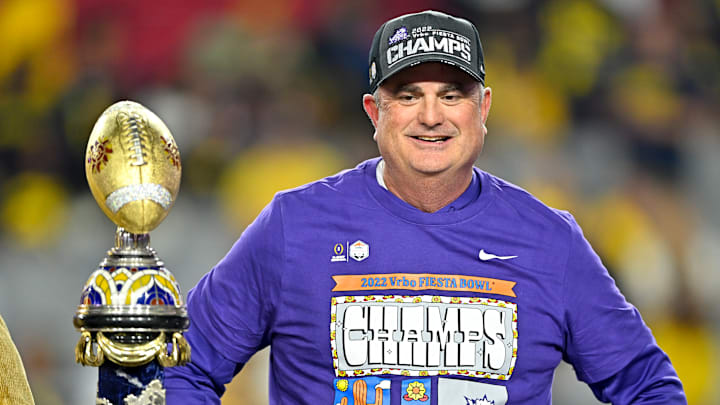The TCU Horned Frogs were 7.5 point underdogs entering the 2022 College Football Playoff at the Fiesta Bowl. But they overcame the odds and defeated mighty Michigan 51-45 to advance to the CFP National Championship game. Head coach Sonny Dykes revealed how his team cracked the code against the Wolverines — or rather, how they prevented their opponents from cracking them.
“We had some intel that (the sign stealing) was going on,” Dykes told On3's Brett McMurphy at Big 12 media days. “Look everybody does it to an extent, but we had some intel that it was kind of next level there.” TCU altered its play calls ahead of the national semifinal match in order to ensure Michigan couldn't use its intelligence against it.
“We changed some signs, we left some the same,” Dykes explained. “We found out early enough (before the game) where we could change a lot of our signals and then we had some dummy signals and some things where we checked a dummy signal to a signal that we knew they knew. We got some favorable matchups because of that and, yeah, there was some big plays in the game.”
TCU beat Michigan at its own game before beating it in a real game
It's fair to be skeptical of the statement that TCU's ability to change its play signals after learning of Michigan's "stealing" tactics was the sole reason it defeated the Wolverines. Two pick-sixes and a fumble on the goal line certainly helped as well.
TCU finished the game with 488 yards on offense. Only the Ohio State Buckeyes (492 yards) managed to gain more against Michigan that year. The Horned Frogs' 51 points were also the most allowed by the Wolverines that season.
“I think at one point, it was late in the game, it seemed to me that they quit worrying about it,” Dykes said of Michigan's attempts to solve his team's signals. “I think we got them once or twice and they were like ‘OK, these guys are hip to it.’
“Ultimately I don’t know if it was the difference in the ball game, but it certainly helped," he conceded.
The NCAA still has not ruled on Michigan’s sign stealing scandal and the last update from the governing body came in June when president Charlie Baker said he expected a determination in the next 30-90 days.
